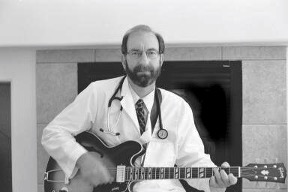By Julia Albertson
“To achieve all that is possible, we must attempt the impossible.” Carved in stone at the University of Denver, his alma mater, the quote carries Dr. Joel Cooper through his ongoing journey of unconventional challenges and achievements.
Originally from the Greater Los Angeles region in southern California, Cooper’s academic career began at the University of Denver, where he double-majored in mass communications and psychology. He was inducted into the ΦBK Gamma of Colorado chapter and graduated in 1976.
After graduation, Cooper channeled his creativity into journalism, adhering to the value on which he bases many of his career and life decisions. “Truth is my catalyst. It is my vitamin pill. It defines me. It says who I am. It is my raison d’être and sine qua non,” Cooper said. As a creative individual committed to public service, journalism was the obvious choice while entering the working world. “Journalism is an eminently honorable profession,” he said. “Journalists are paid to tell the truth.” Starting his career as a freelance writer and photographer around the Los Angeles area, he moved to advertising and public relations agency positions, crafting ad campaigns and public relations programs for clients in Silicon Valley and Denver, Colorado. In 1991, he became an accomplished medical reporter for various hospital publications and organizations before launching his career in an entirely new direction.
When he enrolled in the Arizona College of Osteopathic Medicine (AZCOM), he was in his mid-forties, one of the oldest students in his class, he said. “It was harder for me to get information into my brain, and it took longer for me to pull it out or retrieve it. Think of it as a hard drive in a computer. When you are younger, the hard drive is still pretty empty or clear. Things go on it readily. But when you get older, there is a lot more stuff on your hard drive.” Cooper insists that the roadblocks to re-entering academia pushed him to develop new methods of thinking and learning. In April 2003, he was given the “Inspirational Student Award” at AZCOM, and in 2010, he graduated from his family medicine residency program.
Liberal arts and medicine converge at Cooper’s underlying core values of truth and service, proving a rational transition. “Medicine to me represented the continuation of a process I had already started as a medical journalist. It was not a quantum leap. It was simply a move along the continuum of knowledge.” Medical school enriched his clinical skill set, allowing him to go the extra mile for those he was already educating about conditions and treatments. The clinical element allows him to fully serve patients, he said. Cooper is currently a Telehealth physician in Phoenix, Arizona, where he resides, and is licensed to practice medicine in 17 states. However, he has not surrendered journalism, claiming that his careers complement each other. “Being a doctor makes me a better medical writer and reporter, and being a medical writer and reporter makes me a better and more empathic physician,” he said. “The two go together beautifully.” In March 2018, he was awarded the Excellence in Journalism award from the American College of Emergency Physicians for his article “Overcrowding in the Emergency Department: Causes, Fallacies, and Fixes.”
Supplemented by his experience in journalism and advertising, Cooper embraces his hidden passion and talent for music through songwriting. Originally playing lead guitar in high school blues and rock bands, today he prefers to spend his time in the studio producing songs track by track.
“I never know what is going to come out when I walk into the recording studio. That’s the magic of the creative process,” Cooper said.
He is an accomplished musician who has composed hundreds of songs in multiple genres.

Despite a busy professional life, Cooper also makes time for his photography, a hobby emerging from his undergraduate studies. He has since retired his 35 mm camera for digital, capturing the beauty of nature surrounding him.
“God provides the scene, I merely press the button,” he said.



Balancing an assembly of hobbies and careers has proven challenging and may seem impossible to some. Cooper reflects on the keys to his success, crediting the physical ΦBK key, the symbol of The Phi Beta Kappa Society, for encapsulating his values and setting a high bar for his professional and personal pursuits. “It sets a standard by which I live, which influences everything I do and attempt in my life,” said Cooper. “No matter what happens in my life, I can always fall back upon the key. That simple piece of engraved metal is magic.”
Julia Albertson is a senior at Temple University pursuing a Bachelor of Arts in environmental studies with a journalism studies minor. She was inducted by Temple University’s Rho of Pennsylvania chapter in May 2021.




